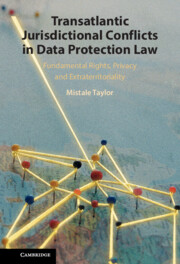 Transatlantic Jurisdictional Conflicts in Data Protection Law
Transatlantic Jurisdictional Conflicts in Data Protection Law Published online by Cambridge University Press: 06 April 2023
The question is raised of whether the EU is acting with the goal to raise rights protection standards for the global community in its exercise of extraterritorial jurisdiction in the data protection sphere. The research conceives of the EU’s exercise of jurisdiction as falling somewhere into three categories along a spectrum: pure rule diffusion (third States enacting laws to trade with the EU), consequential norm diffusion (third States striving for strong data protection having internalised these laws), or full norm export (the EU actively spreading a high data protection standard globally). First, the EU has used its market leverage to influence third State law. Second, the EU’s actions could incidentally ratchet up global data protection standards and start to take on more of a normative character; it could be consequential norm diffusion. Third, although initially appearing parochial, the EU increasingly sells its data protection regulation worldwide as the gold standard. Consequential norm diffusion, as opposed to self-proclaimed norm export, is the most effective way of spreading values in practice, but the EU also has responsibilities not to exercise jurisdictional overreach in viewing its role solely as an exporter of a strict data protection norm.
To save this book to your Kindle, first ensure no-reply@cambridge.org is added to your Approved Personal Document E-mail List under your Personal Document Settings on the Manage Your Content and Devices page of your Amazon account. Then enter the ‘name’ part of your Kindle email address below. Find out more about saving to your Kindle.
Note you can select to save to either the @free.kindle.com or @kindle.com variations. ‘@free.kindle.com’ emails are free but can only be saved to your device when it is connected to wi-fi. ‘@kindle.com’ emails can be delivered even when you are not connected to wi-fi, but note that service fees apply.
Find out more about the Kindle Personal Document Service.
To save content items to your account, please confirm that you agree to abide by our usage policies. If this is the first time you use this feature, you will be asked to authorise Cambridge Core to connect with your account. Find out more about saving content to Dropbox.
To save content items to your account, please confirm that you agree to abide by our usage policies. If this is the first time you use this feature, you will be asked to authorise Cambridge Core to connect with your account. Find out more about saving content to Google Drive.